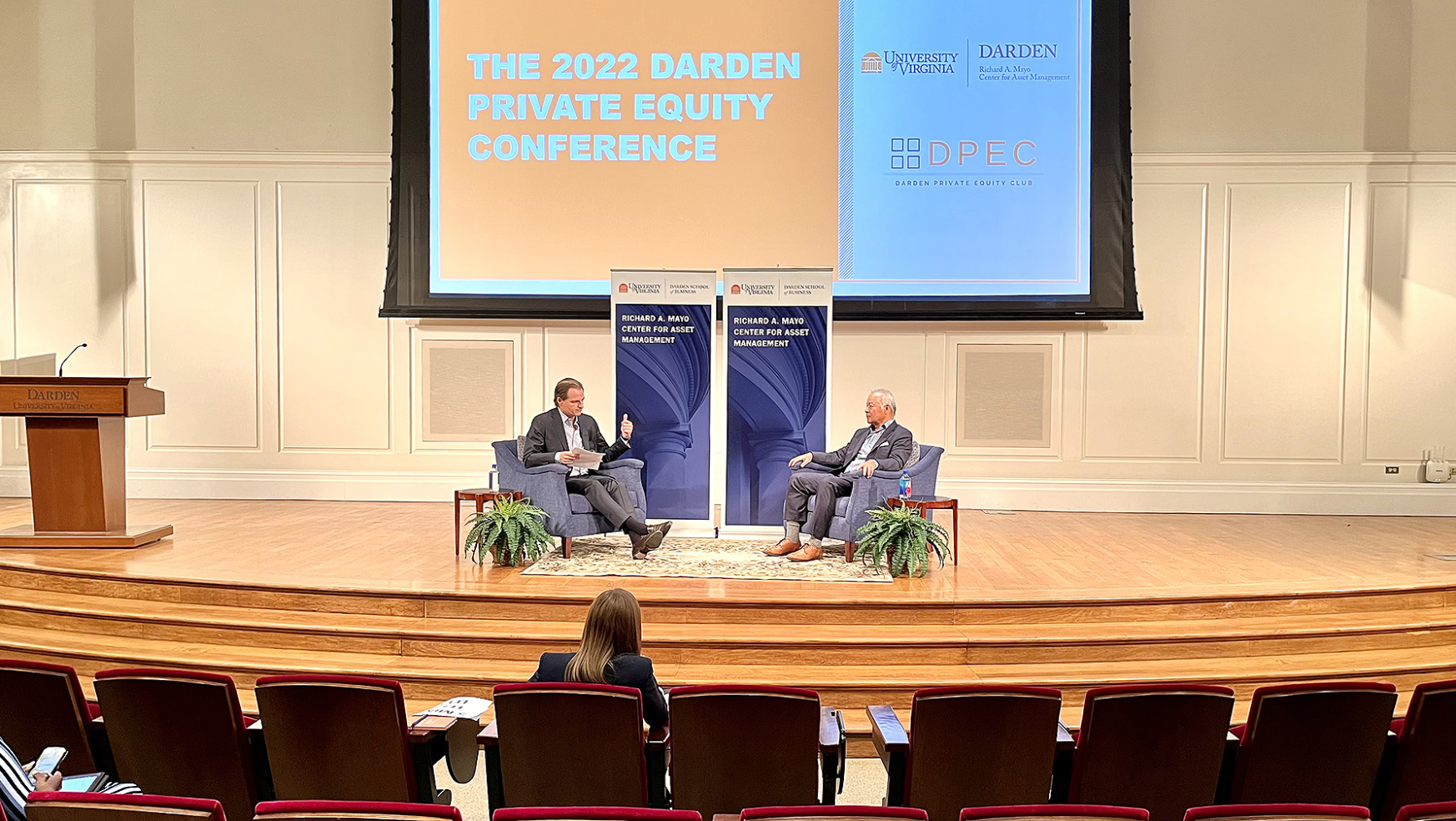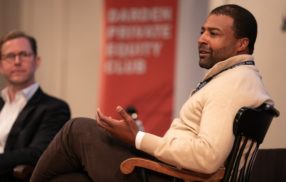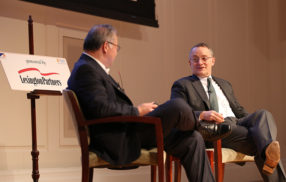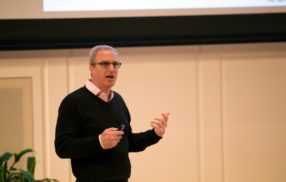
Private Equity Leaders Predict Specialized, Nimble, ESG-Focused Industry Future at UVA Darden Conference
By Jen A. Miller
The University of Virginia Darden School of Business Private Equity Conference kicked off with a keynote talk by David M. Rubenstein, co-founder and co-chairman of The Carlyle Group, a global investment firm with $301 billion of assets under management.
The annual event is organized by the student-run Darden Private Equity Club, with support from Darden’s Richard A. Mayo Center for Asset Management. The event drew students, alumni, and private equity practitioners to UVA to discuss industry hot topics, including impact investing, environmental, social and governance (ESG) investing, the state of the private equity industry, and founding and building private equity firms.
Rubenstein took an unusual path into private equity. Soon after graduating law school, he became a deputy assistant to the president for domestic policy during the Carter Administration. After what he joked was an undistinguished career in law, he learned about the concept of a leveraged buyout from William E. Simon, who pioneered the practice when he and his business partner bought and sold the Gibson Greeting Card company, each investing $330,000 and taking the company public at a value of $290 million. “I didn’t know what a leveraged buyout was, but it was better than practicing law,” Rubenstein quipped.
He and his founding partners started Carlyle in 1987 in Washington, D.C. “In New York City, they would have laughed at us. In D.C., nobody paid attention to us,” Rubenstein said.
As Carlyle grew, so did its offerings. After raising its second buyout fund, he said it “struck him that we could build a private equity firm not unlike Fidelity or T. Rowe Price in structure and have many different funds offering investors many different products” — a growth capital fund, a real estate fund, a buyout fund — all under one roof.
Rubenstein talked about how the industry has changed over time. “Today, most leveraged buyouts aren’t much leveraged,” he said, and “leveraged buyout” is a term almost no one uses, opting for “private equity” instead. “The main difference is it used to be a little sliver of the finance world,” he added, but now is mainstream. And while Carlyle is a public company, that’s not the norm, even as the industry has skyrocketed. “When I started Carlyle, there were 250 private equity firms in the world. Today there’s probably eight or nine thousand. Around 10 or so are publicly traded,” he said.
Private Equity of the Future: Specialized, Nimble
Rubenstein expects new private equity firms to be specialized, focusing on one thing. “It’s tough to build these large global asset management firms. They take a lot of time. People generally only want to invest in one area with people who focus on one thing,” Rubenstein said. That doesn’t mean large firms like Carlyle will have no place. “If you’re a large sovereign wealth fund and you have to deploy billions and billions of dollars, you can’t go to a startup private equity firm focusing on healthy food and say ‘I want to give you $10 billion.’”
Other evolutions in the industry are occurring, as well. Larger private equity firms have sought sources of “permanent capital,” which refers to investment funds that do not have to be returned to investors on a timetable and also reduce potential transaction and regulatory costs. Sources of permanent capital that have drawn much interest recently are the balance sheets of life and annuities companies. As an example, in 2021, private investors owned more than $900 billion of life and annuity assets in Western Europe and North America, and all five of the largest private equity firms have holdings in life insurance that represent 15–50% percent of their total assets under management.
Another welcome change private equity firms have described is the pandemic-related rise of video conferencing tools for fundraising meetings. While Rubenstein said large, institutional limited partners still prefer in-person meetings with their fund managers, video conferencing tools can reduce the time and travel costs of fundraising at scale.
Rubenstein also addressed new disclosure rules for private equity firms proposed by the U.S. Security and Exchange Commission in February. Rubenstein said he did not expect these rules to affect firms like Carlyle, but they might impact firms with fewer regulatory and legal staff members. Everything is “scrutinized in great detail with enormous amounts of disclosure,” Rubenstein said, after which he reminded the audience that “disclosure is not a bad thing.”
For students who want to work in private equity, Rubenstein said their drive has to be about more than just money. “People should go into this industry if they find it intellectually exciting” to discover and build companies, he said. “The most important thing is you enjoy what you’re doing. Nobody ever won a Nobel Prize hating what they do. You have to find something you have a passion for.”
ESG Investing in the Private Equity Sector
Impact and ESG investing in private equity was the focus of the subsequent panel, led by Darden Professor Matthew McBrady, former chief investment officer of BlackRock’s Multi-Strategy hedge fund. The panel opened with questions and discussion around whether private equity firms are truly serious about these issues. There was agreement among the panelists that ESG factors — chiefly, those addressing climate change — have become critically important. Once only the focus of a smaller subset of investors, most large private equity firms have begun planning for large, strategic investments in the clean energy transition, among others.
Panelists reflected that ESG and impact investing in private equity hasn’t always been straight forward or popular. This was most evident during the onset of the global financial crisis in the 2000s, when a “clean tech” bubble burst. While this slowed institutional investors’ momentum in the space, a resurgence was seen less than a decade later, with momentum building meaningfully again over the past several years. Now, efforts around climate-related investing have become a competitive advantage, and something that can be factored into investor allocations, the panelists said.
The panel discussed the imperative that companies exist not just for financial returns but to serve a broader societal purpose, views shared in BlackRock CEO Larry Fink’s well-known 2018 letter to CEOs on stakeholder-focused business. While at first, institutional investors’ ESG investing emphasis was on the “E” and “G,” a meaningful focus on the “Social” aspect has emerged. Further, larger institutional investors have filled new leadership roles with investors from smaller firms who have worked with undercapitalized groups and communities, generating great investment opportunities that also meet meaningful ESG mandates.
For students, the panelists agreed that the need for ESG professionals is growing. There is a stark contrast now to past years, in which even big firms would have one ESG professional to cover the entire space. Now, even small firms have an ESG staff, and large firms have teams of dozens of professionals exclusively focused on ESG.
The job market for these roles has become very competitive, panelists said, and students aspire to ESG-related private equity roles should ensure they are gaining every related skill they can. This can be through working at a nonprofit, doing angel investing, meeting with people on boards of ESG-related groups or volunteering, the panelists said, but cautioned that the most important thing is for the students to ensure the work and experience are as rigorous as possible.
The University of Virginia Darden School of Business prepares responsible global leaders through unparalleled transformational learning experiences. Darden’s graduate degree programs (MBA, MSBA and Ph.D.) and Executive Education & Lifelong Learning programs offered by the Darden School Foundation set the stage for a lifetime of career advancement and impact. Darden’s top-ranked faculty, renowned for teaching excellence, inspires and shapes modern business leadership worldwide through research, thought leadership and business publishing. Darden has Grounds in Charlottesville, Virginia, and the Washington, D.C., area and a global community that includes 18,000 alumni in 90 countries. Darden was established in 1955 at the University of Virginia, a top public university founded by Thomas Jefferson in 1819 in Charlottesville, Virginia.
Press Contact
Molly Mitchell
Senior Associate Director, Editorial and Media Relations
Darden School of Business
University of Virginia
MitchellM@darden.virginia.edu








